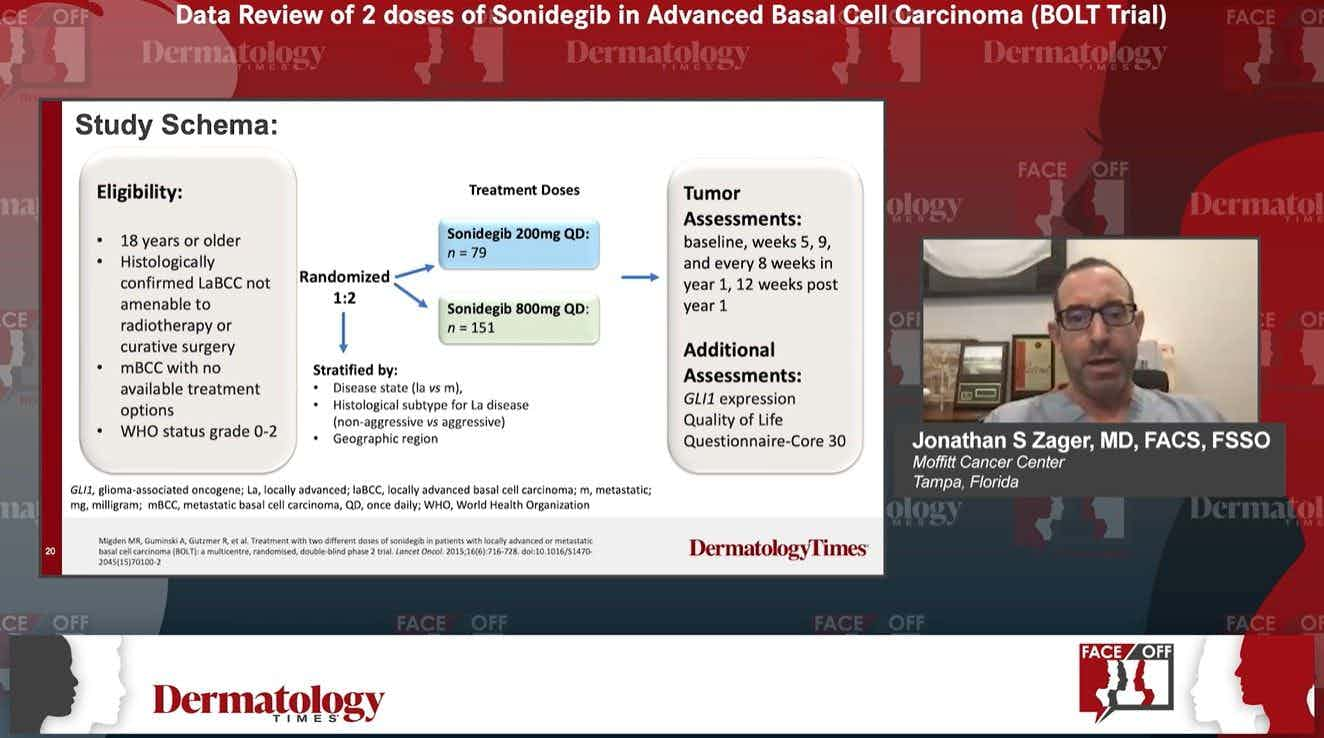- Acne
- Actinic Keratosis
- Aesthetics
- Alopecia
- Atopic Dermatitis
- Buy-and-Bill
- COVID-19
- Case-Based Roundtable
- Chronic Hand Eczema
- Chronic Spontaneous Urticaria
- Drug Watch
- Eczema
- General Dermatology
- Hidradenitis Suppurativa
- Melasma
- NP and PA
- Pediatric Dermatology
- Pigmentary Disorders
- Practice Management
- Precision Medicine and Biologics
- Prurigo Nodularis
- Psoriasis
- Psoriatic Arthritis
- Rare Disease
- Rosacea
- Skin Cancer
- Vitiligo
- Wound Care
Article
The Future of Immunotherapy Targets
Author(s):
With the advent of immunotherapy, the 1-year survival rate for patients with metastatic melanoma has increased from 25% to 50%.
WavebreakmediaMicro/AdobeStock

Immunotherapy, in the form of immune checkpoint inhibitors (ICI), has been a recent breakthrough in the management of both early and late-stage melanoma. With the advent of immunotherapy, the 1-year survival rate for patients with metastatic disease has increased from 25% to 50%.1 ICIs have contributed to improved outcomes of treatment and prognosis of patients with different malignancies and are now served as a standard treatment for advanced melanoma.2
Recent study results revealed that treatment with combined anti-CTLA-4/anti-PD-1 results in median overall survival and a significant durability response, which is superior to that of nivolumab monotherapy and ipilimumab monotherapy.3 Also, the benefits of combined treatment were similar for patients, irrespective of their BRAFV600 mutational and PD-L1 expression status. ICIs provide a significant response in patients with brain metastasis, particularly those who are asymptomatic of malignant infiltration at the time of presentation.4 Study results also revealed that intracranial responses of combined ipilimumab/nivolumab were more than 50% in patients whose metastases have not been treated with brain radiotherapy.5 Another study found that ipilimumab/nivolumab was significantly superior to nivolumab monotherapy with a 5-year survival rate of 51% in patients with asymptomatic disease.6 In the therapeutic field of melanoma, prior immunostimulatory treatments such as interleukin-2 (IL-2) were superseded by ICIs. For high-risk, early-stage melanoma, ipilimumab was found to increase the 3-year recurrence-free rate by more than 10%.6
While surgical excision is the primary treatment for non-melanoma skin cancers (NMSCs), immunotherapy has emerged as a promising treatment option in recent years.7 In the case of NMSCs, ICIs are the most commonly used immunotherapy drugs. These drugs block proteins in cancer cells, preventing the immune system from recognizing and attacking them.8 Clinical trials have shown that ICIs such as pembrolizumab and nivolumab have high response rates and durable responses in patients with advanced NMSCs.9 These drugs have been approved by the US Food and Drug Administration for the treatment of metastatic or locally advanced squamous cell carcinoma (SCC) and basal cell carcinoma (BCC), which cannot be treated with surgery or radiation. Other types of immunotherapies for NMSCs include topical immunomodulators such as imiquimod and ingenol mebutate, which stimulate the immune system to attack cancer cells locally.10 Intralesional immunotherapy, which involves injecting an immune-stimulating substance directly into the tumor, is also being investigated as a potential treatment option. For the treatment of cutaneous SCC (cSCC), pembrolizumab and cemiplimab, two single-agent anti-PD-1 inhibitors, exhibited an overall response rate of 42% and 52% in recurrent/metastatic disease and locally advanced disease, respectively, when used as frontline, first-line treatment for advanced or metastatic cSCC that is not responsive to surgery or radiation.11 Both medications had long-lasting effects with manageable side effects. Merkle cell carcinoma (MCC), like cSCC, is a very immunogenic illness and a promising target for immunotherapy based on ICI. In pre-treated patients with advanced MCC, the JAVELIN Merkel 200 study showed that avelumab resulted in a 33.0% overall response rate and a median duration of response of 40.5 months.12 In comparison to cSCC, BCCs are at least two times more prevalent. The metastatic rate for BCCs is less than 1%, which is substantially lower than that for cSCCs and MCCs. Moreover, cemiplimab has been shown to generate a strong antitumor response in patients with locally advanced BCC.13
Biomarkers of response to immunotherapy in melanoma have been studied to help identify patients most likely to benefit from treatment and develop new therapeutic strategies. Programmed death-ligand 1 (PD-L1) is a protein expressed on the surface of some cancer cells, including melanoma.14 It interacts with the programmed death-1 (PD-1) receptor on T cells, inhibiting their activity and preventing the immune system from attacking cancer cells. Tumors with high levels of PD-L1 expression are more likely to respond to PD-1/PD-L1 checkpoint inhibitors. Tumor mutational burden (TMB) measures the number of mutations present in a tumor's DNA. High TMB is associated with an increased likelihood of response to ICIs, as these mutations may generate new tumor antigens that can be recognized by the immune system.15 TMB is naturally elevated in melanoma and correlates with better responses to immune checkpoint inhibition depending on the severity of cancer. However, it is not regularly used as a predictor of ICI response. Melanoma responds exceedingly well to ICI; hence, a biomarker of ICI resistance may be more important than a biomarker of response in clinical care. Tumor-infiltrating lymphocytes (TILs) are immune cells that have migrated into the tumor microenvironment. Tumors with high levels of TILs are more likely to respond to immunotherapy, as they indicate an ongoing immune response against the tumor.16 The biomarkers of immunotherapy response in melanoma also include immune gene expression profiling and the gut microbiome. Gene expression profiling can be used to assess the activity of immune-related genes within the tumor microenvironment.17 Certain gene signatures have been associated with response to immunotherapy in melanoma. The composition of the gut microbiome has been shown to affect the efficacy of immune checkpoint inhibitors.18 Studies suggest that a more diverse gut microbiome is associated with a better response to immunotherapy.
Biomarkers that can help predict immunotherapy response or resistance in non-melanoma skin cancers include Interferon-gamma (IFN-γ) signature, Immunoscore, and Circulating tumor DNA (ctDNA). Interferon-gamma (IFN-γ) signature is a cytokine that plays a vital role in activating the immune system.19 Tumors with a high IFN-γ signature may be more likely to respond to immunotherapy. The Immunoscore is a measure of the immune cell infiltration and activation within a tumor. A higher Immunoscore may indicate a better response to immunotherapy.20 Circulating tumor DNA (ctDNA) refers to small fragments of DNA that are shed by tumor cells into the bloodstream. The presence of ctDNA may indicate the presence of residual disease, and monitoring ctDNA levels may help predict response to immunotherapy.21
Immunotherapy has revolutionized the treatment of melanoma and non-melanoma skin cancers, and research is ongoing to identify new targets and improve existing therapies. Now considered the gold standard for treating advanced melanoma, immune checkpoint inhibitors (ICIs) have helped improve the treatment and prognosis of patients with a variety of cancers. Median overall survival and a substantial, durable response are achieved with anti-CTLA-4/anti-PD-1 combination therapy. Previous immunostimulatory therapies, such as interleukin-2 (IL-2), have been replaced by immune checkpoint inhibitors in the therapeutic field of melanoma. Patients with advanced NMSCs have shown both a high response rate and long-lasting responses to immune checkpoint inhibitors like pembrolizumab and nivolumab, according to clinical trials. Immunotherapy has been shown to be effective against melanoma, and researchers have been looking at biomarkers of response to better target treatment towards patients suffering from skin cancers. PD-L1 expression, TMB, MSI, TILs, and HPV status have all been identified as potential biomarkers of response to immunotherapy in melanoma and non-melanoma skin cancers. However, additional research is needed to better understand the complex interplay between the tumor microenvironment and the immune system.
References
1. Bagchi S, Yuan R, Engleman EG. Immune checkpoint inhibitors for the treatment of cancer: Clinical impact and mechanisms of response and resistance. Annual Review of Pathology: Mechanisms of Disease. 2021;16(1):223-249. doi:https://doi.org/10.1146/annurev-pathol-042020-042741
2. Kostine M, Rouxel L, Barnetche T, et al. Rheumatic disorders associated with immune checkpoint inhibitors in patients with cancer—clinical aspects and relationship with tumour response: a single-centre prospective cohort study. Annals of the Rheumatic Diseases. 2017;77(3):393-398. doi:https://doi.org/10.1136/annrheumdis-2017-212257
3. Hwang JK, Hong J, Yun CO. Oncolytic viruses and immune checkpoint inhibitors: Preclinical developments to clinical trials. International Journal of Molecular Sciences. 2020;21(22):8627. doi:https://doi.org/10.3390/ijms21228627
4. Bence C, Hofman V, Chamorey E, et al. Association of combined PD ‐L1 expression and tumour‐infiltrating lymphocyte features with survival and treatment outcomes in patients with metastatic melanoma. Journal of the European Academy of Dermatology and Venereology. 2019;34(5):984-994. doi:https://doi.org/10.1111/jdv.16016
5. Suda K. Recent Advances in cancer immunotherapy. Biomolecules. 2021;11(2):335. doi:https://doi.org/10.3390/biom11020335
6. Zimmer L, Livingstone E, Hassel JC, et al. Adjuvant nivolumab plus ipilimumab or nivolumab monotherapy versus placebo in patients with resected stage IV melanoma with no evidence of disease (IMMUNED): a randomised, double-blind, placebo-controlled, phase 2 trial. The Lancet. 2020;395(10236):1558-1568. doi:https://doi.org/10.1016/s0140-6736(20)30417-7
7. Shalhout SZ, Emerick KS, Kaufman HL, Miller DM. Immunotherapy for non-melanoma skin cancer. Current Oncology Reports. 2021;23(11). doi:https://doi.org/10.1007/s11912-021-01120-z
8. Zelin E, Maronese CA, Dri A, et al. Identifying candidates for immunotherapy among patients with non-melanoma skin cancer: A review of the potential predictors of response. Journal of Clinical Medicine. 2022;11(12):3364. doi:https://doi.org/10.3390/jcm11123364
9. Fahradyan A, Howell AC, Wolfswinkel EM, Tsuha M, Sheth P, Wong AK. Updates on the management of non-melanoma skin cancer (NMSC). Healthcare. 2017;5(4). doi:https://doi.org/10.3390/healthcare5040082
10. Cives M, Mannavola F, Lospalluti L, et al. Non-melanoma skin cancers: Biological and clinical features. International Journal of Molecular Sciences. 2020;21(15). doi:https://doi.org/10.3390/ijms21155394
11. Ascierto PA, Schadendorf D. Immunotherapy in non-melanoma skin cancer: Updates and new perspectives. Drugs in Context. 2019;8:1-6. doi:https://doi.org/10.7573/dic.212583
12. Shalhout SZ, Emerick KS, Kaufman HL, Miller DM. Immunotherapy for non-melanoma skin cancer. Current Oncology Reports. 2021;23(11). doi:https://doi.org/10.1007/s11912-021-01120-z
13. Stratigos AJ, Sekulic A, Peris K, et al. Cemiplimab in locally advanced basal cell carcinoma after hedgehog inhibitor therapy: an open-label, multi-centre, single-arm, phase 2 trial. The Lancet Oncology. 2021;22(6):848-857. doi:https://doi.org/10.1016/s1470-2045(21)00126-1
14. Berghoff AS, Ricken G, Widhalm G, et al. Tumour-infiltrating lymphocytes and expression of programmed death ligand 1 (PD-L1) in melanoma brain metastases. Histopathology. 2014;66(2):289-299. doi:https://doi.org/10.1111/his.12537
15. Jardim DL, Goodman A, de Melo Gagliato D, Kurzrock R. The challenges of tumor mutational burden as an immunotherapy biomarker. Cancer Cell. 2021;39(2):154-173. doi:https://doi.org/10.1016/j.ccell.2020.10.001
16. Paijens ST, Vledder A, de Bruyn M, Nijman HW. Tumor-infiltrating lymphocytes in the immunotherapy era. Cellular & Molecular Immunology. Published online November 2, 2020:1-18. doi:https://doi.org/10.1038/s41423-020-00565-9
17. Farberg AS, Marson JW, Glazer A, et al. Expert consensus on the use of prognostic gene expression profiling tests for the management of cutaneous melanoma: Consensus from the skin cancer prevention working group. Dermatology and Therapy. 2022;12(4):807-823. doi:https://doi.org/10.1007/s13555-022-00709-x
18. Rezasoltani S, Yadegar A, Asadzadeh Aghdaei H, Reza Zali M. Modulatory effects of gut microbiome in cancer immunotherapy: A novel paradigm for blockade of immune checkpoint inhibitors. Cancer Medicine. 2020;10(3):1141-1154. doi:https://doi.org/10.1002/cam4.3694
19. Bridge JA, Lee JC, Daud A, Wells JW, Bluestone JA. Cytokines, chemokines, and other biomarkers of response for checkpoint inhibitor therapy in skin cancer. Frontiers in Medicine. 2018;5. doi:https://doi.org/10.3389/fmed.2018.00351
20. Bruni D, Angell HK, Galon J. The immune contexture and Immunoscore in cancer prognosis and therapeutic efficacy. Nature Reviews Cancer. Published online August 4, 2020:1-19. doi:https://doi.org/10.1038/s41568-020-0285-7
21. Cabel L, Riva F, Servois V, et al. Circulating tumor DNA changes for early monitoring of anti-PD1 immunotherapy: a proof-of-concept study. Annals of Oncology. 2017;28(8):1996-2001. doi:https://doi.org/10.1093/annonc/mdx212
Newsletter
Like what you’re reading? Subscribe to Dermatology Times for weekly updates on therapies, innovations, and real-world practice tips.















